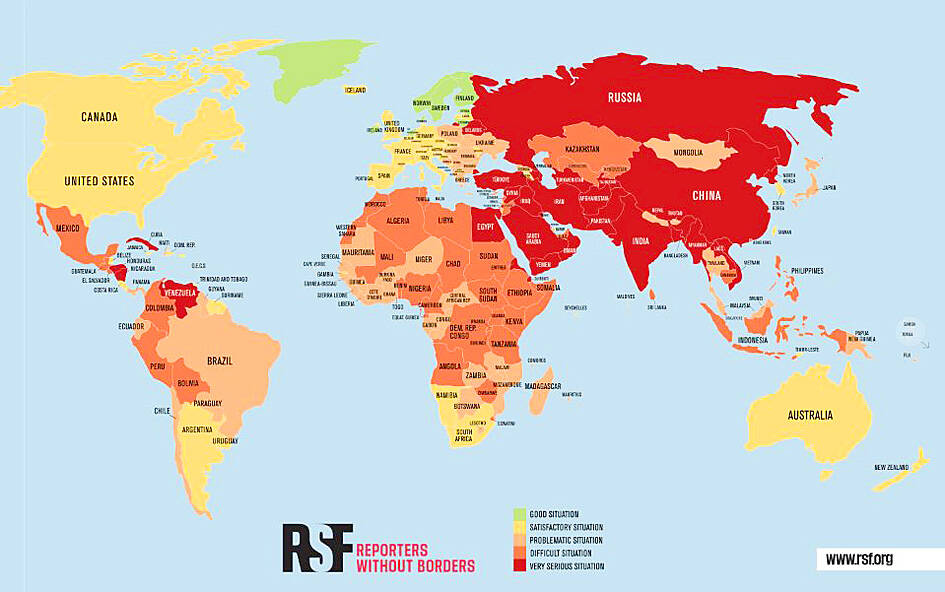China was the biggest global jailer of journalists last year with more than 100 behind bars as Chinese President Xi Jinping’s (習近平) government tightened control over society, Reporters Without Borders said on Wednesday.
The Chinese government was also one of the biggest exporters of propaganda, according to the media freedom group.
China was listed second, behind only North Korea, in the group’s annual index of media freedoms.

Photo courtesy of the Reporters Without Borders (RSF)
The Chinese Communist Party (CCP) has tightened already strict controls on media in China, where all newspapers and broadcasters are state-owned.
Web sites and social media are required to enforce censorship that bans material that might spread opposition to the country’s one-party rule.
Xi, China’s most powerful figure in decades, called for journalists to adhere to “the correct orientation of public opinion” during a 2016 meeting with reporters who had been awarded official prizes.
Xi is pursuing a “crusade against journalism,” the report said, adding that the decline in China’s media freedoms was “disastrous.”
Beijing operates what is regarded as the world’s most extensive system of Internet controls. Its filters try to block the Chinese public from seeing Web sites abroad operated by news outlets, governments and human rights groups.
Chinese journalists have been prosecuted on charges of spying, leaking national secrets and “picking quarrels,” a vague accusation used to jail dissidents. Others are subjected to surveillance, intimidation and harassment.
Journalist Dong Yuyu (董鬱玉), who worked at a CCP-affiliated newspaper and is a former Harvard University fellow, faces espionage charges after being detained for more than a year, his family said last week.
Chinese-born Australian journalist Cheng Lei (成蕾) last year was tried in China on national security charges, but has yet to learn the verdict, Australian Minister for Foreign Affairs Penny Wong (黃英賢) said in March.
Cheng worked for CGTN, the English-language state television channel aimed at foreign audiences. She was detained in August 2019 and accused of sharing state secrets.
In Hong Kong, the CCP forced the Apple Daily newspaper to shut down as part of a crackdown on pro-democracy sentiment.
Apple Daily founder Jimmy Lai (黎智英) was convicted of fraud last year, a charge his supporters said was politically motivated. Six other former executives pleaded guilty.

Tropical Storm Gaemi strengthened into a typhoon at 2pm yesterday, and could make landfall in Yilan County tomorrow, the Central Weather Administration (CWA) said yesterday. The agency was scheduled to issue a sea warning at 11:30pm yesterday, and could issue a land warning later today. Gaemi was moving north-northwest at 4kph, carrying maximum sustained winds near its center of up to 118.8kph and gusts of 154.8kph. The circumference is forecast to reach eastern Taiwan tomorrow morning, with the center making landfall in Yilan County later that night before departing from the north coast, CWA weather forecaster Kuan Shin-ping (官欣平) said yesterday. Uncertainty remains and

SEA WARNING LIKELY: The storm, named Gaemi, could become a moderate typhoon on Wednesday or Thursday, with the Taipei City Government preparing for flooding A tropical depression east of the Philippines developed into a tropical storm named Gaemi at 2pm yesterday, and was moving toward eastern Taiwan, the Central Weather Administration (CWA) said. Gaemi could begin to affect Taiwan proper on Tuesday, lasting until Friday, and could develop into a moderate typhoon on Wednesday or Thursday, it said. A sea warning for Gaemi could be issued as early as Tuesday morning, it added. Gaemi, the third tropical storm in the Pacific Ocean this typhoon season, is projected to begin moving northwest today, and be closest to Taiwan on Wednesday or Thursday, the agency said. Today, there would likely

DISRUPTIONS: The high-speed rail is to operate as normal, while several airlines either canceled flights or announced early departures or late arrivals Schools and offices in 15 cities and counties are to be closed today due to Typhoon Gaemi, local governments announced last night. The 15 are: Taipei, New Taipei City, Taoyuan, Tainan, Keelung, Hsinchu and Kaohsiung, as well as Yilan, Hualien, Hsinchu, Miaoli, Chiayi, Pingtung, Penghu and Lienchiang counties. People should brace for torrential rainfall brought by the storm, with its center forecast to make landfall on the east coast between tonight and tomorrow morning, the Central Weather Administration (CWA) said. The agency issued a sea warning for the typhoon at 11:30pm on Monday, followed by a land warning at 11:30am yesterday. As of

CASUALTY: A 70-year-old woman was killed by a falling tree in Kaohsiung as the premier warned all government agencies to remain on high alert for the next 24 hours Schools and offices nationwide are to be closed for a second day today as Typhoon Gaemi crosses over the nation, bringing torrential rain and whipping winds. Gaemi was forecast to make landfall late last night. From Tuesday night, its outer band brought substantial rainfall and strong winds to the nation. As of 6:15pm last night, the typhoon’s center was 20km southeast of Hualien County, Central Weather Administration (CWA) data showed. It was moving at 19kph and had a radius of 250km. As of 3pm yesterday, one woman had died, while 58 people were injured, the Central Emergency Operation Center said. The 70-year-old